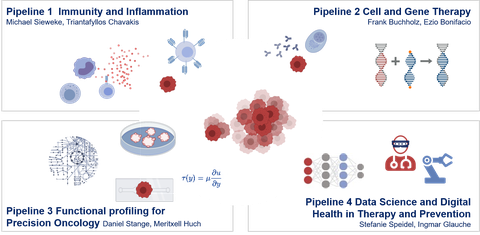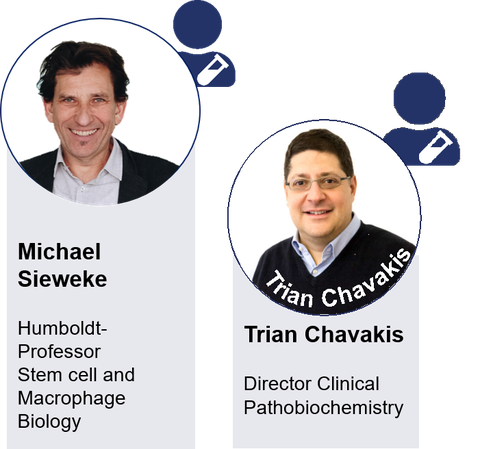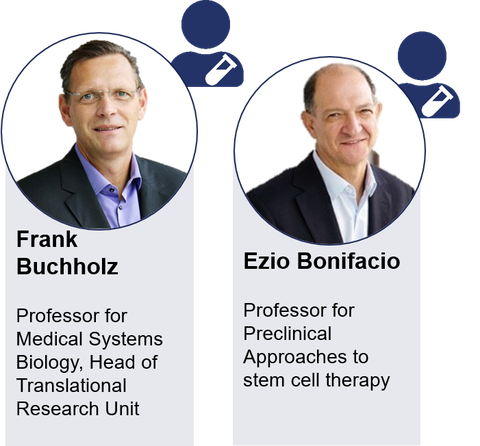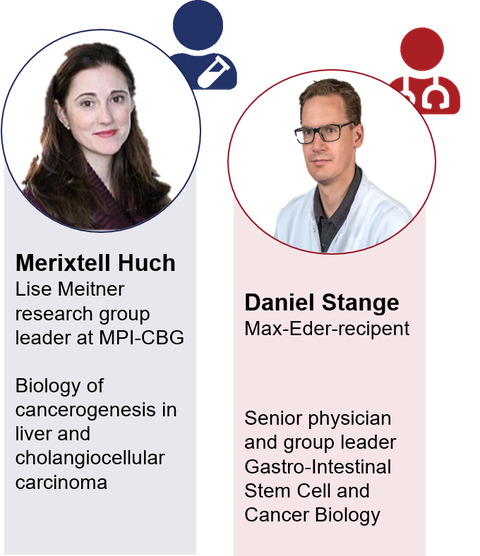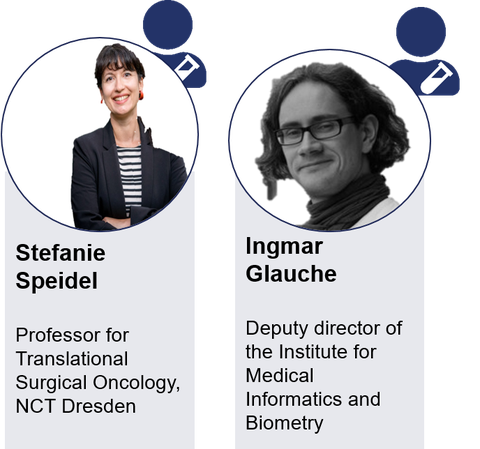Research pipelines
In recent years, Dresden clinician and medical scientists have already generated outstanding, translationally relevant findings. Based on this, the four CAMINO research pipelines have been defined. Thus., CAMINO fellows have the unique opportunity to form research alliances with leading experts.
1- Immunity and Inflammation
The link between inflammation and cancer development and progression is an emerging concept, which is actively pursued by several groups within the local research network. To this end, trained immunity has been a very strong area of research. In a pivotal pre-clinical study, the group of Triantafyllos Chavakis has demonstrated that priming of hematopoietic stem and progenitor cells with ß-glucan shows anti-tumor activity of neutrophils derived from primed hematopoietic stem and progenitor cells (1). The group of Humboldt professor Michael Sieweke at the Center of Regenerative Therapies Dresden (CRTD) (2) has described fascinating mechanisms of epigenetic imprinting of trained immunity in hematopoietic cells. The same group envisions to develop genetically modified macrophages as an off-the-shelf therapeutic in the future (3).
2 - Cell and Gene Therapy
This research pipeline offers the unique opportunity to participate in the development of the groundbreaking technologies of Michael Bachmann from Helmholtz Zentrum Dresden-Rossendorf. His research group was one of the first in the world to develop switchable chimeric antigen receptor-bearing T cells (CAR-T cells) and to take them through to clinical phase I testing in a joint spin-off with oncologist Gerhard Ehninger (4). Also of great innovation are the designer recombinases developed by Frank Buchholz, which enable targeted and safe gene editing and are also on their way to clinical application (5). With the recently acquired Cluster4Future "SaxoCell" (www.saxocell.com), further translational research and application areas will emerge in this field, whose speaker is Ezio Bonifacio.
3 - Functional profiling for Precision Oncology
Daniel Stange, Advanced Clinician Scientist at VTG and former Max Eder junior research group leader, together with Claudia Ball from Hanno Glimm's AG, from the NCT/UCC, and Meritxell Huch from the Max Planck Institute of Molecular Cell Biology and Genetics (MPI-CBG), established the use of organoids at the Dresden campus (6,7). This research pipline further focusses on tumor environment and metabolism, as well as molecular stratification.
4- Data Science and Digital Health in Therapy and Prevention
Stefanie Speidel, group leader at the NCT/UCC, has been able to establish new methods for the development of novel image- and robot-assisted surgical and radiation procedures. In addition, successful methods for modeling and diagnosing leukemias have been developed by Ingmar Glauche and working groups from the field of hematology in cooperation with Karsten Wendt from the TU Dresden (8,9).
1. Kalafati L, Kourtzelis I, Schulte-Schrepping J, Li X, Hatzioannou A, Grinenko T, Cavakis T, et al. Innate Immune Training of Granulopoiesis Promotes Anti-tumor Activity. Cell. 2020;183(3):771-85 e12.
2. de Laval B, Maurizio J, Kandalla PK, Brisou G, Simonnet L, Huber C, Sieweke MH, et al. C/EBPbeta-Dependent Epigenetic Memory Induces Trained Immunity in Hematopoietic Stem Cells. Cell Stem Cell. 2020;26(5):793.
3. Soucie EL, Weng Z, Geirsdottir L, Molawi K, Maurizio J, Fenouil R, Sieweke MH et al. Lineage-specific enhancers activate self-renewal genes in macrophages and embryonic stem cells. Science. 2016;351(6274):aad5510.
4. Arndt C, von Bonin M, Cartellieri M, Feldmann A, Koristka S, Michalk I, Bachmann M et al. Redirection of T cells with a first fully humanized bispecific CD33-CD3 antibody efficiently eliminates AML blasts without harming hematopoietic stem cells. Leukemia. 2013;27(4):964-7.
5. Karpinski J, Hauber I, Chemnitz J, Schafer C, Paszkowski-Rogacz M, Chakraborty D, Buchholz F, et al. Directed evolution of a recombinase that excises the provirus of most HIV-1 primary isolates with high specificity. Nat Biotechnol. 2016;34(4):401-9.
6. Broutier L, Mastrogiovanni G, Verstegen MM, Francies HE, Gavarro LM, Bradshaw CR, Huch M et al. Human primary liver cancer-derived organoid cultures for disease modeling and drug screening. Nat Med. 2017;23(12):1424-35.
7. Seidlitz T, Merker SR, Rothe A, Zakrzewski F, von Neubeck C, Grutzmann K, Stange DE ,et al. Human gastric cancer modelling using organoids. Gut. 2019;68(2):207-17.
8. Hahnel T, Baldow C, Guilhot J, Guilhot F, Saussele S, Mustjoki S, Glauche I , et al. Model-Based Inference and Classification of Immunologic Control Mechanisms from TKI Cessation and Dose Reduction in Patients with CML. Cancer Res. 2020;80(11):2394-406.
9. Eckardt JN, Bornhaeuser M, Wendt K, Middeke JM. Application of machine learning in the management of acute myeloid leukemia: current practice and future prospects. Blood Adv. 2020;4(23):6077-85.
